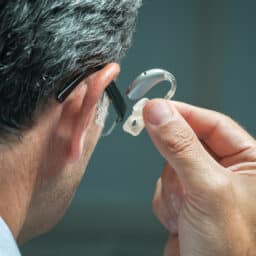How to Have a Stress-Free Shopping Experience With Hearing Loss

Shopping with hearing loss can be a stressful experience. Whether you’re buying clothes, food, school supplies or other items, a busy store can sometimes feel overwhelming and confusing. Check out our list of tips for navigating your shopping trip with hearing loss. Choose the Right Stores With hearing loss, commotion from a busy store can…
Will Second-Hand Hearing Aids Work?

According to the National Institute on Deafness and Other Communication Disorders, approximately 15% of American adults report some trouble hearing. That means that there are millions of Americans who could benefit from using hearing aids. If you are considering hearing aid options, you may be curious about second-hand options, either from a family member or…
How To Tell a Loved One They May Need Hearing Aids

Hearing loss is a common chronic condition that affects millions of people every year. If you feel like a parent, spouse or other loved one has developed hearing problems, you may be wondering how to talk to them about taking steps toward treating their hearing loss with hearing aids. Hearing Loss Becomes More Common with…
Why Does My Hearing Aid Buzz While I’m on My Cell Phone?

Hearing aids can help improve your communication and awareness by amplifying speech sounds and reducing background noise. If you’ve decided to start using these small but powerful devices to treat your hearing loss, one thing to watch out for when choosing which style you want is how they interact with cell phones. Some hearing aids…
Here’s Why You Should Take a Loved One to Your Audiology Appointment

Bringing a companion, whether a partner, child or close friend, to your audiology appointment may provide more benefits than you’d initially expect. Let’s look at some benefits you, your loved ones and your audiologist might experience. Your Companion Provides Extra Insight It can be difficult to be objective about your own hearing loss. Not only…
Tips for Pairing Your Hearing Aids With Other Technology

Approximately one in eight people in the United States aged 12 years or older has hearing loss. Hearing aids can be a great way to minimize the effects of hearing loss and help you enjoy your life to the fullest. One of the ways they do that is by allowing you to connect with other…
How To Keep Your Hearing Aids Safe from Pets

Are you among the 7.1% of adults who uses a hearing aid and 66% of U.S. households who own a pet? If so, it’s important that you take measures to ensure your pets don’t get ahold of your hearing devices. Not only is it a huge expense and inconvenience, but if your pet ingests a…
How To Tell People About Your Hearing Aids

In 2019, the Centers for Disease Control and Prevention (CDC) found that 7.1% of adults aged 45 and over used a hearing aid. If you’ve recently made a choice to become one of the millions to treat your hearing loss with hearing aids, congratulations! They are an excellent investment in your personal well-being and overall…
Three Daily Hearing Aid Care Tips

Hearing loss is a common condition. The National Institute on Deafness and Other Communication Disorders states, “One in eight people in the United States (13 percent, or 30 million) aged 12 years or older has hearing loss in both ears, based on standard hearing examinations.” The good news is that hearing aids help people with…
How to Protect Your Hearing Aids This Spring

According to the National Institute on Deafness and Other Communication Disorders, “One in eight people in the United States (13 percent, or 30 million) aged 12 years or older has hearing loss in both ears.” If you’re among this population and you wear hearing aids, you may be wondering how you can protect them during…
